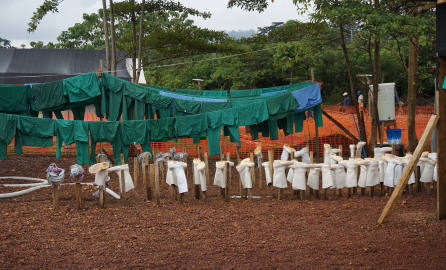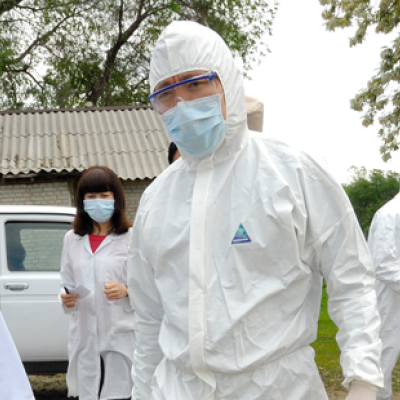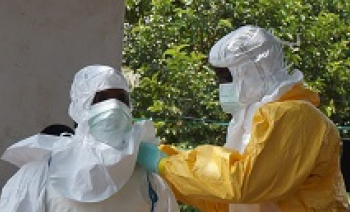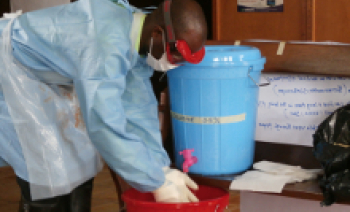The Ebola outbreak has already taken many lives in Western Africa, and the long-term economic consequences for affected countries are likely to be dramatic. Such crises can easily spiral out of control and affect other parts of the world, including the European Union. So, what is the EU doing to address this major health crisis? And what can we learn from it in order to avoid facing a similar situation in the future?
“Ebola is something we all need to learn from collectively” said EuropeAid Deputy Director General Marcus Cornaro on his return from a visit to Sierra Leone and Liberia; two of the three countries which have been hit the hardest by the outbreak. “The European Commission is [providing huge] support, overall about a 180 million euro package, of which today a good 20 per cent has already been disbursed”. The EU and its Member States have now pledged more than €1 billion in response to the Ebola crisis in West Africa.
The EU approach is a comprehensive one: “We are one of the only actors that can cover the broad range of support to small NGOs, provide mobile laboratories, but also address some of the macroeconomic imbalances and shocks these countries are experiencing” added Mr Cornaro.
The EU Mobile Laboratories – used to test patient blood samples for Ebola – were one of the first responses to the Ebola outbreak on the ground. Guéckédou in Guinea is considered to be the point of origin of the current Ebola outbreak, discovered in December 2013. Patient zero is thought to have been a two year old child from the village of Méliando, five kilometers away from Guéckédou. The first EU mobile lab was in place by March 2014.
Staff working at the lab in Guéckédou
The EC then quickly deployed two further labs to Foya, Liberia, and to Enugu and Port Harcourt, Nigeria, where according to recent statements by the World Health Organization (WHO) the epidemic is now contained.
A strong asset of the mobile labs is that they can be deployed in 24 hours and are quickly operational and efficient. Their equipment is transported in small, orange plastic boxes weighing no more than 32 kilograms that can be carried by lab staff via commercial flights.
The boxes being transported
“These laboratories come fully equipped with staff, they run seven days a week on twelve hours shifts,” explained Mr Cornaro. Inside the labs, test results are available within four hours. In Guéckédou, over the first six months of the project, around one in six cases was detected by the mobile lab.
“Sometimes, the EU Mobile Labs staff have to process fifty, eighty samples per day. It takes really the whole day until the night, and the team arrives at 10 or 11 pm to the hotel, and then has to start again at 8 o’clock in the morning” added Stephan Günther, the team leader of the EU Mobile Labs project. “We exchange the teams every three weeks because it is really stressful, especially when you have so many samples to process. The total duration in the field is about four weeks for a team member and there is no weekend”.
When a patient tests negative for Ebola at the EU lab, he or she is provided with a certificate of discharge. This is a key step to avoid patients’ stigmatisation when they go back to their community. “We test a patient usually once or twice to make sure this patient is negative for Ebola virus before he or she is discharged and can go back to the community and, to prevent stigmatisation, we provide them with a certificate which is then signed by the Ministry of Health, Médecins sans Frontières and the EU Mobile Lab staff.”
The EU Mobile Labs are coordinated in partnership with other donors present on the ground. “We are deployed under the Global Outbreak Alert and Response Network (GOARN) of WHO, so all the logistics, bringing the team to the field, bringing the reagents to the site of operations is [the] responsibility of WHO. They are also in charge of security and safety of the team” explained Mr Günther. “At the back of the lab in Guéckédou is Médecins sans Frontières’s treatment centre. And this is of course very convenient for them to have the lab so close. That means that when they take a sample, it can be processed immediately.” This collaboration is key in the daily fight against the epidemic.
The project approach is a long-term one, as lab staff also provide training and equipment to local staff, ensuring that they are better prepared to address future outbreaks. For example in Nigeria, local technicians were trained and, once the local epidemic was contained, the equipment handed over to national authorities.
Confronted with the unexpectedly vast scale of the epidemic, the EC has decided to complement the EU mobile labs project with another initiative that will mobilise a more robust mobile laboratory in the region, the so-called "fourth" lab. This new generation of EU labs will become operational in West Africa in early 2015. By then, Mr Cornaro hopes that the exponential increase in contaminations will have begun to be contained in affected countries. “Hopefully by the end of this year, you would have a situation where, from that gradually exponential curve of increase, you would move into a flattened curve and then early next year into a decrease and slowly back to a situation of normality”.
|
The EU mobile labs project is part of a larger scheme designed under the long-term component of the EC’s Instrument contributing to Stability and Peace (IcSP). This scheme aims at supporting prevention, preparedness and response efforts in cases of major Chemical, Biological, Radiological and Nuclear (CBRN) crises in the EU's neighbourhood, Africa, Central Asia and South-East Asia. It builds on a network of experts developed as part of the EC’s Centres of Excellence (CoE) initiative. Under the coordination of their regional secretariats, these Centres unite both EU and local experts in eight regions of the world, to discuss issues of common concern related to CBRN issues. These Centres will play a crucial role in learning lessons from the current Ebola outbreak, preparing for the future, and preventing the current situation repeating itself. Beyond the West African Ebola outbreak, the regional secretariat of the African Atlantic Façade, located in Rabat, Morocco, has already mobilised its network of local and EU experts to develop further preventive measures for the future of the region. |
Find out more about the EU Mobile Labs in the project on capacity4dev.eu, which contains photos from the labs and more information about the project. You can also take a tour of the Mobile Labs in Foya and Guéckédou. For the latest news on the labs you can visit the EU Mobile Lab Project website.
This collaborative piece was drafted by Vincent Chasteloux from EuropeAid with support from the capacity4dev.eu Coordination Team. Images courtesy of the EU Mobile Lab Teams.





Log in with your EU Login account to post or comment on the platform.